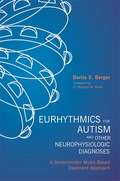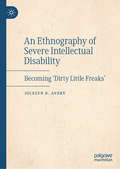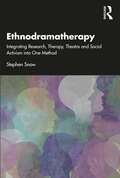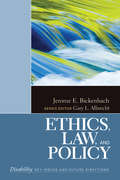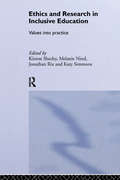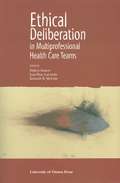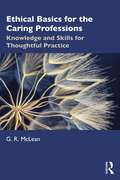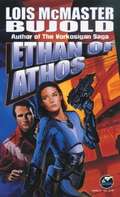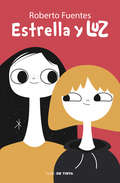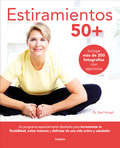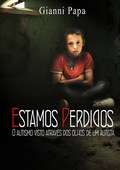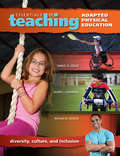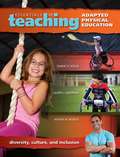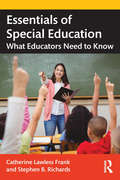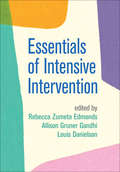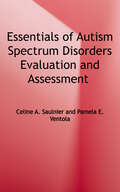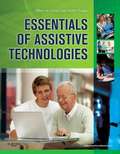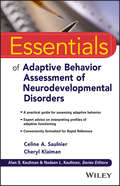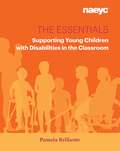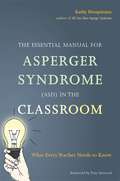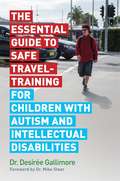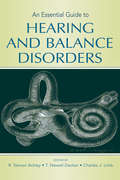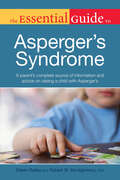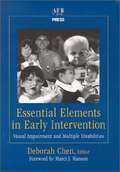- Table View
- List View
Eurhythmics for Autism and Other Neurophysiologic Diagnoses: A Sensorimotor Music-Based Treatment Approach
by Stephen M. Shore Dorita S. BergerIn Eurhythmics for Autism and Other Neurophysiologic Diagnoses, Dorita S. Berger reveals how Eurhythmics, a method of teaching the musical concepts of rhythm, structure and expression kinaesthetically through movement, can help develop sensorimotor skills in children and adults with autism and other special needs. Covering both theory and practice, she explains this innovative, music-based approach and how it can also address cognitive and sensory issues in adults with debilitating conditions, such as dementia or post-traumatic stress disorder. With a particular emphasis on autism, she provides clear and adaptable session plans, suitable for working with children and adults of all ages.
An Ethnography of Severe Intellectual Disability: Becoming 'Dirty Little Freaks'
by Jocelyn D. AveryIn this ethnographic investigation of a special education needs college in Australia, Jocelyn D. Avery explores how the self-identity of people with severe intellectual identities is influenced by carers and support people in their lives. Employing theoretical foundations of self-identity and embodiment and drawing largely on Mary Douglas’s (1996) notions of ritual and hygiene, purity and danger, Avery argues that students in this environment are treated as though they exist in a vacuum, rather than a highly complex social environment: strategies to ‘contain’ their difficult selves ultimately lead to continued confinement, as if the students themselves were ‘contaminated’. In the midst of this much-needed ethnography, Avery meditates on her own role: matters of consent, communication, and cooperation pose a challenge to anthropological engagement with severe intellectual disability, but researcher ethics and positionality have their own difficulties. The reflection provided here will provide a guide for future researchers to sensitively engage with people with disability.
Ethnodramatherapy: Integrating Research, Therapy, Theatre and Social Activism into One Method
by Stephen SnowEthnodramatherapy explores the integration of the performance ethnography method, known as ethnodrama, with the principles and practices of drama therapy to establish a sound theoretical formulation for ethnodramatherapy, and considers its use as art, as therapy, as research and as a vehicle for social justice. The book begins by defining ethnodramatherapy – an original synthesis created by the author through deep study and practice of Mienczakowski’s enthnodrama, combined with 35 years of his own practice and research in drama therapy, creative arts therapies and therapeutic theatre. The book describes the origins of ethnodramatherapy, along with its evolution and method. It then delves into applications of the practice highlighted by five case studies with different audiences in different settings. Subjects include adults with developmental disabilities, female adolescents in youth protection, caregivers for loved ones with mental illnesses and Chinese students exploring controversial issues of oppression in China. Complex ethical issues are reviewed and suggestions are made on how to deal with some of the challenging ethical situations that are likely to arise in the ethnodramatherapy process. What emerges is a powerful tool that harnesses theatrical art, ethnographic research and the clinical techniques of drama therapy to create a potential for emancipatory experience for both performers and audiences. This exciting and dynamic synthesis of drama therapy, performance ethnography, theatrical art and social activism will be of interest to the whole community of theatre practitioners and scholars who use theatre to effect individual and social change, including the disciplines of applied theatre, theatre education, experimental theatre, performance studies, and, of course, drama therapy, psychodrama and the other creative arts therapies.
Ethics, Law, and Policy
by Dr Jerome E. BickenbachThis volume in The SAGE Reference Series on Disability explores ethical, legal, and policy issues of people with disabilities, and is one of eight volumes in the cross-disciplinary and issues-based series, which examines topics central to the lives of individuals with disabilities and their families. With a balance of history, theory, research, and application, specialists set out the findings and implications of research and practice for others whose current or future work involves the care and/or study of those with disabilities, as well as for the disabled themselves. The presentation style (concise and engaging) emphasizes accessibility. Taken individually, each volume sets out the fundamentals of the topic it addresses, accompanied by compiled data and statistics, recommended further readings, a guide to organizations and associations, and other annotated resources, thus providing the ideal introductory platform and gateway for further study. Taken together, the series represents both a survey of major disability issues and a guide to new directions and trends and contemporary resources in the field as a whole.
Ethics and Research in Inclusive Education: Values into practice
by Kieron Sheehy Melanie Nind Jonathan Rix Katy SimmonsThe recent move towards inclusive education has radically influenced the way educational research is conducted. Students need to become aware of the critical legal and ethical responsibilities that arise from investigation in this new and expanding area. Written from the standpoint of inclusive education, rather than 'special education', this carefully edited collection of readings from a wide variety of sources, will develop the student's ability to: * identify and respond to ethical dilemmas that occur within their particular research methodologies and settings. * respond appropriately to the myriad of complex legal issues that are pertinent to their own workThe contributions to this book draw upon examples of inclusive practices from around the world. Students taking postgraduate courses or diplomas in Inclusive education will find this an invaluable read.
Ethical Deliberation in Multiprofessional Health Care Teams
by Hubert Doucet Jean-Marc Larouche Kenneth R. MelchinThis study analyzes both pragmatic and theoretical perspectives of ethical deliberation, as well as the professional and philosophical backgrounds for the ethical deliberation of social workers, nurses and doctors working in the field of chronic illness. In doing so, this volume expands the scope of current research through an analysis of the process and its dynamics.
Ethical Basics for the Caring Professions: Knowledge and Skills for Thoughtful Practice
by G. R. McLeanThis book trains students of the caring professions, across health and social care, in the basic philosophical skills and knowledge needed to deal with the ethical aspects of their profession. It shows why ethical education is required, and teaches the skills of reasoning that equip professionals to think critically about the theories and arguments used in ethical discussions. It demonstrates how we can be confident that we can rely on common moral ground; but it also points out how we need to recognise the influence of different world-views, and to note how, on some issues, these can lead us in starkly different directions. It explains relevant philosophical theories, and evaluates their strengths and weaknesses – particularly in relation to what is required for proper professional ethics. It shows how to employ the commonly accepted framework of four ethical principles – beneficence, non-maleficence, autonomy, and justice. These various matters are then illustrated in two extended case studies, which focus on the problem of euthanasia, and the question of screening for disability and the value of human life. Ethical Basics for the Caring Professions is designed for use on all health and social care and human services courses on ethics and values. It will also be of interest to academics and professionals working within these fields.
Ethan of Athos (Miles Vorkosigan #3)
by Lois Mcmaster BujoldEthan had something the Cetagandans would kill for. If only he knew what it was... You might think that an obstetrician on a planet forbidden to women would be underemployed.
Estrella y Luz
by Roberto FuentesEl tercer título de Roberto Fuentes protagonizado por Estrella, la viajera intergaláctica Luz es especial. Habla poco y, cuando lo hace, muchas personas no la entienden. Le gusta mirar las estrellas desde su balcón y pasar tardes junto a su familia. Su vida da un giro cuando llega a vivir a la casa de enfrente Estrella, una niña de su misma edad que parece entenderla mejor que nadie.
Estiramientos 50+
by Dr Karl KnopfMejora tu flexibilidad, mejora tu salud. Un libro de ejercicios y rutinas de estiramientos para mantener un cuerpo sano y flexible pasados los 50. En Estiramientos +50 encontrarás más de 90 rutinas fáciles y seguras para mantener un cuerpo sano y flexible, sin importar la edad. Con solo diez minutos al día de práctica en casa, ayudarás a mejorar tu movilidad, sin dolor ni lesiones. Desde los calentamientos y flexiones más idóneos para el cuerpo hasta ejercicios con bandas elásticas, rodillos o fitballs: descubre los trucos clave para no dejar de estar en forma nunca.
Estamos Perdidos. O autismo visto através dos olhos de um autista.
by Gianni Papa Marily Santos de SouzaOs pais de uma criança descobrem que o filho é autista. Começa, a partir daquele momento, uma descida no inferno da reabilitação, de médicos despreparados, de psicólogas catastróficas, de pessoas normais horripilantes e pessoas competentes. "Estamos Perdidos" é um livro verdade, que nos narra a estória de uma criança autista, a partir do seu próprio ponto de vista. Gianni Papa amplifica, como uma caixa de som, a voz interior do interprete principal: uma criança autista que descreve a estrada percorrida pela sua família através da experiência do seu complicado desenvolvimento. Os personagens principais não têm um nome, a família é como muitas na Itália, abandonadas no vazio normativo e assistencial, obrigadas a aprender experimentando e às vezes errando, como curar e resolver as dificuldades que derivam de uma situação que lhes coloca fora daquilo que se pode definir "normalidade". O interprete é Eu: uma criança autista, o pai é papai, a mãe é mamãe, e o irmão é o menino pequeno com os cabelos vermelhos. Somente os personagens que cercam a família têm nome e, às vezes, sobrenome. E assim conhecemos a vovó Cinzia, vovó Katya, vovô Francesco, zio Fabio e etc... Nesse livro, Gianni Papa soube interpretar em modo legítimo o pensamento da criança, dando voz à "criança que não sabe falar (mesmo sabendo falar)". Uma criança que observa o mundo ao seu redor e que, como todas as crianças, não pode entender em profundidade o significado de certos comportamentos dos adultos. Uma criança que na dramatização do seu ser, narra com leveza e extrema simplicidade, como só as crianças sabem fazer. Uma criança que vê os adultos complicarem os percursos óbvios e transformar em difíceis os relacionamentos simples. Uma criança que acata as decisões dos grandes com a naturalidade de quem sabe aceitar como sendo justo até aquilo que poderia estar errado e não sabe se perguntar porq.
Essentials of Teaching Adapted Physical Education: Diversity, Culture, and Inclusion
by Samuel Hodge Lauren Lieberman Nathan MurataEssentials of Teaching Adapted Physical Education: Diversity, Culture, and Inclusion offers a wealth of knowledge for teaching today's diverse student population, including those with disabilities. Readers will learn how to teach a variety of students, organize learning within various curricular models, assess and evaluate students, and manage behavior. Readers will also learn more about the conditions and disabilities they may encounter when teaching, how to understand students' various abilities, and how to adapt and modify instructional methods to include all students.The book emphasizes the importance of being culturally responsive and acquiring the necessary knowledge to infuse appropriate, socially just practices into educational settings. Future teachers will learn how to apply culturally responsive instructional methods and behavior management strategies and will understand broader social and economic contexts for their students' behavior.At the same time, this book provides more than a how-to approach to teaching adapted physical education. Its content and features promote reflective learning, encouraging readers to anticipate the types of teaching situations and challenges that may arise and think through how they will respond. Scenarios and vignettes throughout provide context for the material and promote critical thinking and problem solving.
Essentials of Teaching Adapted Physical Education: Diversity, Culture, and Inclusion
by Samuel R. Hodge Lauren J. Lieberman Nathan M. MurataEssentials of Teaching Adapted Physical Education: Diversity, Culture, and Inclusion offers a wealth of knowledge for teaching today's diverse student population, including those with disabilities. Readers will learn how to teach a variety of students, organize learning within various curricular models, assess and evaluate students, and manage behavior. Readers will also learn more about the conditions and disabilities they may encounter when teaching, how to understand students' various abilities, and how to adapt and modify instructional methods to include all students. The book emphasizes the importance of being culturally responsive and acquiring the necessary knowledge to infuse appropriate, socially just practices into educational settings. Future teachers will learn how to apply culturally responsive instructional methods and behavior management strategies and will understand broader social and economic contexts for their students' behavior. At the same time, this book provides more than a how-to approach to teaching adapted physical education. Its content and features promote reflective learning, encouraging readers to anticipate the types of teaching situations and challenges that may arise and think through how they will respond. Scenarios and vignettes throughout provide context for the material and promote critical thinking and problem solving.
Essentials of Special Education: What Educators Need to Know
by Catherine Lawless Frank Stephen B. RichardsIn this succinct yet comprehensive text, authors Lawless Frank and Richards guide readers through the essential basics that every educator needs to know about special education, covering everything from law to application. Streamlined and accessible chapters address legal knowledge – Section 504, IDEA, ESSA, and FERPA — assessment and identification, RTI, categories of disability, IEPs, accommodations, co-teaching, and instructional considerations. Designed to give new educators a focused introduction to critical concepts and terminology, this book also features supplemental online resources including an Instructor’s Manual, quizzes, and more.
Essentials of Intensive Intervention (The Guilford Series on Intensive Instruction)
by Rebecca Zumeta Edmonds Allison Gruner Gandhi Louis DanielsonFew evidence-based resources exist for supporting elementary and secondary students who require intensive intervention--typically Tier 3 within a multi-tiered system of support (MTSS). Filling a gap in the field, this book brings together leading experts to present data-based individualization (DBI), a systematic approach to providing intensive intervention which is applicable to reading, math, and behavior. Key components of the DBI process are explained in detail, including screening, progress monitoring, and the use and ongoing adaptation of validated interventions. The book also addresses ways to ensure successful, sustained implementation and provides application exercises and FAQs. Readers are guided to access and utilize numerous free online DBI resources--tool charts, planning materials, sample activities, downloadable forms, and more.
Essentials of Autism Spectrum Disorders Evaluation and Assessment (Essentials of Psychological Assessment Ser.)
by Celine A. Saulnier Pamela E. VentolaQuickly acquire the knowledge and skills you need to utilize the varied assessments frequently used in evaluating autism spectrum disorders With both the detection and awareness of autism spectrum disorders (ASD) on the rise, there is an urgent need for an increasing number of professionals to not only learn about the nature and course of the various autism spectrum disorders, but also to know how to identify, assess, and diagnose the presence of these disorders. Essentials of Autism Spectrum Disorders Evaluation and Assessment addresses the main domains of assessment, defines the purpose of the assessment, suggests test instruments, and discusses the unique clinical applications of each instrument to the diagnosis of ASD. Like all the volumes in the Essentials of Psychological Assessment series, each concise chapter features numerous callout boxes highlighting key concepts, bulleted points, and extensive illustrative material, as well as test questions that help you gauge and reinforce your grasp of the information covered. Providing an in-depth look at ASD evaluation and assessment, this straightforward book includes samples of integrated reports from comprehensive model diagnostic evaluations and prepares clinical and school psychologists, as well as speech and language pathologists, to effectively evaluate and assess ASD. - Complete coverage of the identification andassessment of autism spectrum disorders -Expert advice on avoiding common pitfalls -Conveniently formatted for rapid reference -Other titles in the Essentials of Psychological Assessment series: -Essentials of Dyslexia Assessment and Intervention -Essentials of Assessment Report Writing -Essentials of School Neuropsychological Assessment -Essentials of Evidence-Based Academic Interventions -Essentials of Specific Learning Disability Identification -Essentials of Processing Assessment -Essentials of Executive Function Assessment -Essentials of Cross-Battery Assessment, Second Edition
Essentials of Assistive Technologies
by Albert M. Cook Jan Millar PolgarMaster the assistive strategies you need to make confident clinical decisions and help improve the quality of life for people with disabilities with this new essentials text. Based on the Human Activity Assistive Technology (HAAT) model developed by Dr. Cook, the book provides the most important coverage of the devices, services, and practices that comprise assistive technology and focuses on the relationship between the human user and the assisted activity within specific contexts. Case studies, illustrations of assistive devices, review questions, and well-developed learning objectives help you focus on the most important areas of assistive technology application.
Essentials of Adaptive Behavior Assessment of Neurodevelopmental Disorders (Essentials of Psychological Assessment)
by Celine A. Saulnier Cheryl KlaimanA practical guide to adaptive behaviors across a range of neurodevelopmental disorders Adaptive behavior assessment measures independent living skills, including communication, social skills, personal care, and practical work skills. For individuals with intellectual disabilities, evaluation of these skills is a critical tool for measuring eligibility and can identify specific skills that must be learned before effective educational interventions can be implemented. Essentials of Adaptive Behavior Assessment of Neurodevelopmental Disorders describes the role of adaptive behavior in assessment and treatment, and provides clear guidance for measurement. Case samples provide real-world illustration of behaviors and assessment, and systematic comparison of various measures are presented and explained to better inform planning. Individual chapters outline specific adaptive behaviors across a range of neurodevelopmental disorders, giving clinicians, practitioners, students, and researchers a better understanding of diagnostic differentials and how to place independent skill programming in treatment and intervention. Plan intervention and treatment based on accessible measurement guidelines across a range of disorders Gain a deeper understanding of adaptive functioning specific to ADHD, autism spectrum disorders, disruptive behavior disorders, and genetic disorders Compare and contrast current measures to evaluate their strengths, weaknesses, and areas of overlap Quickly locate essential information with Rapid Reference and Caution boxes For individuals with neurodevelopmental disorders, adaptive behaviors are the keys to independence; without them, these individuals will perpetually struggle with achieving optimum independence without the basic skills needed to function at home, in school, and in the community. Assessment allows these skills to be factored in to treatment and intervention planning, and can help improve the outcomes of other intervention methods. Essentials of Adaptive Behavior Assessment of Neurodevelopmental Disorders clarifies the assessment of these important behaviors, helping clinicians make more informed decisions around diagnosis, education, and treatment planning.
The Essentials: Supporting Young Children with Disabilities in the Classroom (The Essentials Series)
by Pamela BrillanteChances are, at some point in your early childhood career, you will work with children who have, or might have, a developmental delay or disability, along with their families. This book offers essential information about disabilities and how they impact young children’s learning and development. More than that, it encourages you to go beyond a child’s disability label to see her strengths, needs, interests, and preferences and to figure out how best to support those in the classroom, just as you do for any other child. Regardless of medical diagnoses or individual challenges, children with disabilities are first and foremost children. This book is a resource for early childhood educators and preservice teachers who work or will work with children birth through age 8 who have developmental delays or disabilities. Program directors and administrators as well as providers of physical, occupational, and speech-language therapy will also find the information in this book useful as they work with teachers and families to help children become active participants in their environments and master a variety of skills. This book will help you understand more about disabilities and their implications for children and families, and this knowledge, along with your understanding of children in general, will help you recognize and rebut inaccurate or harmful stereotypes and attitudes about individuals with disabilities.
The Essential Manual for Asperger Syndrome (ASD) in the Classroom: What Every Teacher Needs to Know
by Rebecca Houkamau Kathy HoopmannPerfect for time-poor teachers, Kathy Hoopmann's essential handbook is an easy-to-navigate resource that promotes a positive learning environment in which students with Asperger syndrome (ASD) can thrive. Kathy's unique ability to explain the ASD mind-set shines through as her concise descriptions reveal how to recognise and develop the child's strengths to the fullest potential whilst guiding and mentoring through areas of difficulties. Full of effective and innovative strategies, the book covers areas such as meltdowns, forming friendships, literal thinking and speaking, and the overwhelming influence of sensory sensitivities. Activities to help explain the child's behaviour to other students are also included which fosters understanding and acceptance. A 'Home Link' section adds vital information about how to work with parents and other caregivers to create safe, loving and fun environments for the child at home and at school. With illustrations throughout, this book will be of immeasurable value to anyone who is working in a classroom setting with children with ASD.
The Essential Guide to Safe Travel-Training for Children with Autism and Intellectual Disabilities
by Martha D'Avigdor Lizzie D'Avigdor Dr Mike Steer Dr Dr Desirée GallimoreFor those growing up with an intellectual disability or autism, comfortable, safe and independent travel will prove an invaluable life skill. The key to pursuing fulfilling work and leisure activities and developing as an individual, it also brings a liberating level of self-sufficiency and reassurance of equality within society. Arriving at this goal can be daunting. Dr Gallimore's straightforward five-step system will guide parents and professionals through successful training for children of any age and ability. Focusing on understanding each child's individual goals and challenges, it gives you the 'ingredients' needed to fully prepare for each journey in advance, and shows how to judge when to step back and let the child progress alone. Addressing specific fears and obstacles that make travel difficult for children with learning difficulties, it sets out all the precautions necessary to safeguard children and others as they learn to reach their chosen destinations. Clear-cut and far-reaching, this book is enriched by Dr Gallimore's extensive experience as a psychologist, mobility specialist and travel-trainer. It is a heartening resource and will be necessary reading for anyone working with a child to get them on their path to independent travel.
An Essential Guide to Hearing and Balance Disorders
by R. Steven Ackley T. Newell Decker Charles J. LimbAn Essential Guide to Hearing and Balance Disorders consolidates the most significant clinical aspects of hearing and balance disorders, ranging from cause and diagnosis to treatment and cure. Experts in various subspecialties of this extensive topic introduce readers to the most sophisticated and state of the art methods of diagnosis and treatment. Each chapter expands on a specific topic area along the continuum of how medical personnel diagnose hearing and balance disorders, to how surgical implantation of the cochlea and rehabilitation can remedy various conditions. In concise format, the book begins with a case history and follows with comprehensive descriptions of current knowledge regarding fundamental causes of hearing loss and balance disorders, as well as a thorough examination of objective assessment. The latter half of the volume presents specialized treatment and rehabilitative options for various disorders. The chapters in this part cover special topics and conclude with pertinent case studies. Unique areas of discussion in a text of this kind include: genetics of deafness pediatric hearing loss and hearing loss later in life business essentials in audiology private practice professional issues, such as ethics, methods of practice, and conflicts of interest. As its title implies, this book is critically important for all students and professionals in hearing/balance related disciplines, including audiology, otolaryngology, general medicine, and rehabilitation oriented allied health care occupations.
The Essential Guide to Asperger's Syndrome: A Parent’s Complete Source of Information and Advice on Raising a Child with Asp (Essential Guide)
by Eileen Bailey Robert MontgomeryAsperger's Syndrome is a complicated condition that is often misunderstood and misdiagnosed. Parents and caregivers can often find themselves bewildered by the circumstances and accompanying behaviors that are associated with raising a child with Asperger's. The Essential Guide to Asperger's Syndrome is a goldmine of practical advice for dealing with many of the common situations that often confront Aspies and their parents. Through the practical and immensely helpful tips in this book parents will learn how to turn potentially stressful situations into calm, manageable moments. Authoritative and complete, this book provides must-have information on seeking a proper diagnosis, different treatment options, developing social skills, dealing with bullying, finding the right school, and helping the young adult with AS transition to college or more independent living. Helping everyone in the family thrive and survive the challenges of Asperger's, this book will be a guiding light to any parent with an Aspie child.
Essential Elements in Early Intervention: Visual Impairment and Multiple Disabilities
by Deborah ChenThe latest comprehensive resource from an outstanding early childhood specialist, this guide provides a range of information on effective early intervention with young children who are visually impaired and have other disabilities. Containing valuable explanations of functional and clinical vision and hearing assessments, descriptions of evaluative and educational techniques, and useful suggestions on working with families and with professional teams, Essential Elements in Early Intervention provides practitioners with expert insights for successful interventive efforts.
Essays on Blindness Rehabilitation in Honor of Thomas J. Carroll: A Festschrift
by John F. MuldoonThe author of the articles in this book has given us an excellent assessment of Father Carroll's concepts and the viability of those concepts today. Moreover, they have provided us with a look at the man behind the ideas.
